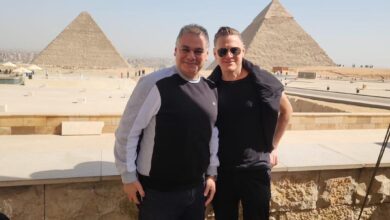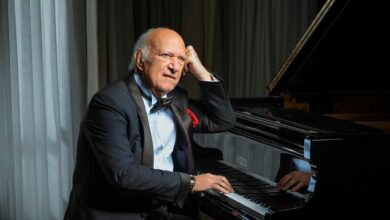On a crisp Friday night, dozens of Egyptians, Poles and miscellaneous expats lounged on orange beanbags to take in the strains of what at first seemed like an unlikely combination: the fusion of Egyptian Sufi and Polish folk music, alongside a reading of Polish poetry translated into Arabic.
This was “Miłosz bil Arabi” (Milosz in Arabic), a concert celebrating Egyptian professor, theater director, critic and writer Hanaa Abdel Fattah’s award-winning translations of Nobel laureate Czesław Miłosz. The Polish Embassy in Cairo collaborated with the Cairo Jazz Club Agency to plan this three-day event, which debuted on 14 October at Darb 1718.
"Miłosz bil Arabi" was promoted as part of the celebrations for the Polish presidency of the European Union, as well as part of “The Year of Miłosz,” a year-long festival taking place around the world.
If the translation of a Polish poet into Arabic sounds like a rare and fraught endeavor, that’s because it is. Compared to other European languages, Polish literature remains relatively under-translated, due to the complexities of the language and the relative lack of qualified translators. Arabic literature has faced similar challenges, both in terms of translating Arabic works into foreign languages and vice-versa.
Abdel Fattah – who is currently a professor at the High Institute of Theatrical Arts in Cairo, but spent several years working in the Warsaw theater community – spoke to the audience before the concert about the challenges of this particular project, which, he noted, has almost sold out in its first print run. “Translating poetry is always a big betrayal,” he said, even as his own words were translated into English by Marcin Styszynski of the Polish Embassy, who served as the interpreter for the evening. “This poetry is not literal poetry. The importance is to put the idea, the message, into an Egyptian Arabic expression … We tried to conserve the Polish feelings of this poetry, so that the spirit of Czesław Miłosz still exists in the Arabic version.”
The professor read a few selections from his translation to give the audience “a feel for the music and emotion of the Arabic language.” It was surprising to hear the rough edges and particular cadence of the Polish language transformed into something that sounded so melodic and sensual. Other audience members remarked that the translation strongly resembled the forms and rhythms of traditional Arabic love poetry.
During the event, the question of Miłosz’s own, sometimes contested cultural identity wasn’t broached, but the issue adds a dimension of complexity to the poet’s location in literary history. Miłosz has been written about as a somewhat perplexing case of identity politics, because his identity as a Polish author, in particular, is defined more by linguistics than by geography. Although he wrote only in Polish, the poet was born and raised in Lithuania and was also fluent in Lithuanian; he later moved to Krakow and Warsaw, then fled Poland after breaking ties with the Communist Party in 1951. He finally spent over half his life living in the US. Miłosz himself was reticent to accept one national label or another, famously stating, “Language is the only homeland.”
Given the complexities of this particular cultural identity matrix, it is perhaps fitting that the "Miłosz bil Arabi" project was similarly engaged in multiple layers of translation: not only the translation of text, but also the translation of text into music, and of Polish folk music into an Egyptian musical idiom.
Renowned musician Maria Pomianowska was the driving force behind this musical collaboration. This is Pomianowska’s second time in Egypt, having performed at the Cairo Opera House last year during the international "Chopin on Five Continents Festival." This time, however, instead of performing with her band, she brought a few of her students to Egypt to work with local musicians. Over the course of three days, the group workshopped several pieces, which included lyrics from Polish and Egyptian folk songs, as well as lyrics taken from Miłosz’s poetry. During the concert, the songs were performed in between actress Solafa Ghanem’s dramatic readings of Abdel Fattah’s translations.
“We play folk tunes from the area that Miłosz spent his childhood, and Arabic tunes that are really similar in terms of emotion to this kind of poetry,” Pomianowska told Al-Masry Al-Youm. “There are some songs that I sing in Polish, and then a singer sings Miłosz poems based on an Arabic melody. This is what I like the most: to find the common points in music, and common tunes that we can sing together. It is like one musical language.”
Egyptian percussionist Khaled Abu Hegaze agreed that the two musical traditions were surprisingly similar. “I was playing Upper Egyptian folkloric beats, and the Polish melodies went very well into those beats,” he explained. “The music from the farms, from the land, is always very similar … Music is always one language.”
Pomianowska also remarked on how different she felt performing in Egypt today, after the 25 January revolution, as compared to her experience performing in Cairo one year ago; and the realities of the current political context lent a subtle but poignant tone to the evening. “Miłosz’s poetry brought the spirit of freedom and democracy to the Polish people, and I believe that nowadays, both in Poland and in Egypt, this is what we are striving for,” Polish Ambassador to Egypt Piotr Puchta told the audience. Poland, of course, experienced its own massive political upheaval only 22 years ago, and resistance to the Communist government and then later optimism for the Solidarność movement had a strong impact on Miłosz himself.
By the end of the first performance of "Miłosz bil Arabi," however, these weighty conceptual issues of cultural identity, and the obstacles of expressing something in different languages or artistic modes, were rendered virtually unimportant. American poet Robert Frost once said that poetry is that which gets lost in translation. But listening to the translated poems and musical responses they inspired served as a reminder that the act of translation also creates something that is just as valuable in its difference.
"Milosz bil Arabi" performances will continue tonight, 16 October, at the Cairo Jazz Club.




